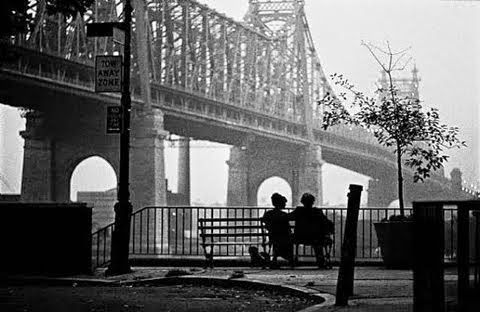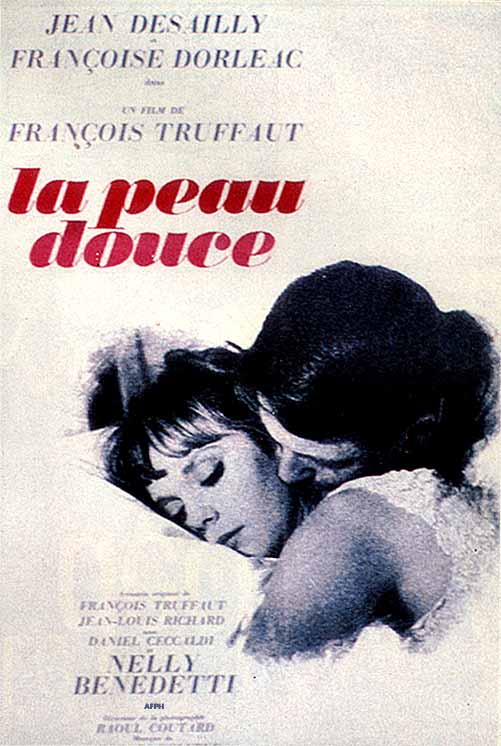The Soft Skin is a seemingly uncomplicated look at a husband who commits adultery and what spirals out from that, and perhaps it is. I may just have a fancy for a well-told story of infidelity, being that it is one of those basic things about living that should be so cut and dry but usually isn't. But it's more than that in Francois Truffaut's case, this being his fourth film as writer/director. The power of the film comes from the details Truffaut puts into the main character, author/professional intellectual Pierre Lachenay, and how he changes as a person when he comes across this one woman, an airline stewardess Nicole, in just the small ways. There is also the family part of it- there always or usually is- and the expected ups and downs of the affair as well as the ultimate hell-to-pay with the marriage. But it's the handling of the melodramatic materials that counts.
Truffaut doesn't judge these people harshly, and neither do we. Pierre puts himself into a position where he can't back out of once he goes that extra step. It's an ironically magical moment as well when this happens, when after Pierre meets this flight attendant on an elevator that he calls up her room number to go out for a drink and when she says yes he turns on all of the lights in his little hotel room one after the other and lays upon the bed. Truffaut doesn't make this too sensationalized - this isn't, for example, the circling with the girl smoking the cigarette in Jules & Jim - it's just a simple moment with this man as he puts on a childish air for a moment when he is decidedly in most other ways definitely not child-like.
 |
| These boxes are worth a million in prizes... like me! |
A lot of what happens to the characters is based on chance and luck- both good and bad much the same way Woody Allen would later play it out in Match Point - if, say, Pierre hadn't gotten to the airport on time, or if he hadn't called his wife Franca from a hotel room on a particular morning, or if Franca hadn't received a certain jacket that had a ticket for pick-up with pictures. It bristles with the drama of life as opposed to straight melodrama, and the actors all being as good as they are brings things to always believable (Desailly as loving but an idiot when it comes to such an affair, both during and after its blown open, Dorleac providing a youthful charm and beauty that makes her human as opposed to a cultish object of worship, and Benedetti as Franca is perfect as the rightfully shocked wife who puts up with the mundane fights at home until later when it really gets WTF).
The success of the film, and why it worked so well for me, is two-pronged. Truffaut understands that desperation and the rules of love can make for so much worthy drama even in the most simple-looking of surfaces. These characters inhabit more of the darker areas of Truffaut's early works like in Jules & Jim, but with heavier consequences: chiefly being, 'how do I live, or love? How do I go on pretending to really be in love, and perhaps I care though really I don't? And does she actually love me back?'
The other thing, aside from the wonderful naturalism of the characters and the acting, is where he places the camera and how editing takes on psychological rhythms. Again he uses freeze-frames as in the past, but sparingly, such as when Pierre is in a luncheon thrown for him by intellectuals and when a "young woman" is said to be outside waiting for him his heart jumps a beat, like "what if they see her here?" when it's really just an autograph hound. Or just the whole nature of those scenes when he's in that town and has to go back and forth between the lunch and Nicole. There's a fully dark-humor aspect to all of this (and the night scenes as a "bore" keeps following along with him and Pierre gets suspicious of Nicole walking around outside and being 'picked up' by a guy on the street.
It's not easy to really pick up, but it's in this middle section that Truffaut subtly hits some of the kind of inventive filmmaking that he had in his much-more touted first three films. It's tonally much more of a straightforward romance drama, but the filmmaker is not giving up the "wave" as changing things. It's more in behavior and style, and how characters act around each other, that is fascinating and works so well and is still (at least for its time) changing how cinema is perceived. That its opening scene, of Georges Delerue's score (which, by the way, is most beautiful in that 'first time' when Pierre first goes into the hotel room with Nicole, a truly unforgettable moment), has, to me, a kind of possibly homage to the opening of Breathless with driving fast in traffic and close-ups of faces and a cop car gave me one of my biggest smiles in weeks.
The Soft Skin carries suspense but from what comes out of everyday things: coming home to the wife and kid, going off on business, and getting a little "something" on the side. Sometimes, for me, that's even more heart-racing than a lot of guns and bullets (though, spoiler, there is one at one crucial point of the film). It's one of those underrated films that you read about, yes, even from a major director such as Truffaut. Sexy, dangerous, and subtle.
 |
| 16 shells from a 30-ought wife |




No comments:
Post a Comment